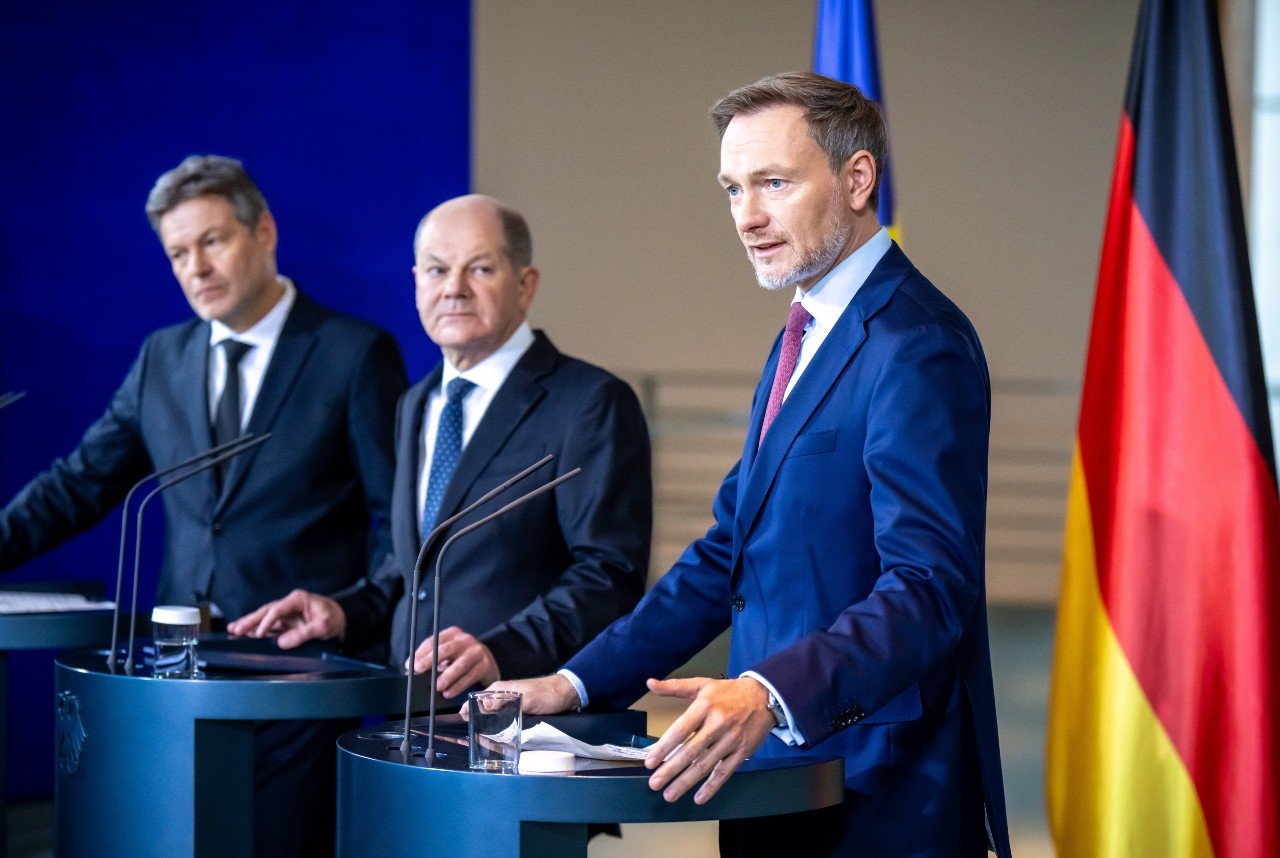KEY POINTS: How Germany plans to solve its budget crisis in 2024

Chancellor Olaf Scholz's coalition has reached an eleventh-hour agreement on how to solve a €17 billion black hole in the budget. With the German government clinging hard to its debt rules, some significant cuts will have to be made.
It's been a nail-biting few weeks for businesses and households in Germany as government ministers tried to thrash out their spending plans.
Thanks to a seminal decision in the Constitution Court back in November, Scholz's coalition has been left trying to fill a €17 billion hole in the nation's finances while still clinging onto its tight restrictions on borrowing.
On Wednesday, after weeks of closed-door negotiations, the chancellor held a press conference alongside Economics Minister Robert Habeck (Greens) and Finance Minister Christian Linder (FDP) to announce that a compromise had been found.
In a major win for the FDP, 2024 will see the return of the controversial debt brake, meaning borrowing will capped at just 0.35 percent of GDP.
Instead, the government will make some hefty cuts - especially in the area of climate protection - and will also try and raise funds through other means.
Here's an overview of how the government wants to stabilise Germany's finances next year.
Major cuts to climate projects
Germany's Climate and Transformation Fund (KTF) has been at the heart of this latest budget crisis - and as things stand, it appears it will be one of its biggest victims.
In its landmark ruling, the Constitutional Court found that €60 billion of borrowing earmarked for the Covid crisis could not be redirected into the Climate Transformation Fund.
The fund is aimed at revamping infrastructure in Germany to make it more climate-friendly, as well as promoting things like eco-friendly transport and renewable energy.
In Wednesday's press conference, Scholz emphasised that these goals hadn't changed, but said the government would have to find ways to achieve them with much less money than before.
READ ALSO: Debt limit returns in German coalition's deal ending budget crisis
That will include scrapping some generous subsidies for e-cars and additional support for the solar industry, among other things, in order to reduce the fund by a total of €45 billion by 2027.
Nevertheless, at least €160 billion for climate projects will remain in place, Scholz emphasised.
Slashing "harmful" subsidies
According to Finance Minister Christian Lindner, the government plans to end or reduce a number of environmentally harmful subsidies, with the savings totaling around €3 billion.
These saving will be used to finance a planned reduction in electricity tax in order to bring energy costs down for households.
"Old subsidies that are no longer needed are now helping us to prioritise future areas," Lindner said.

Economics Minister Robert Habeck (Greens), Chancellor Olaf Scholz (SPD) and Finance Minister Christian Lindner (FDP) hold a press conference in Berlin. Photo: picture alliance/dpa | Michael Kappeler
So far, it isn't entirely clear what harmful subsidies the government is talking about, since classic culprits like the commuter allowance and the lower taxation of company cars and diesel fuels are set to remain the same.
What we do know so far is that subsidies for kerosine will be reduced, meaning flights could get much more expensive. The government is also planning to introduce a tax on plastic that could impact the price of products in plastic packaging, such as toiletries and certain groceries.
Raising the CO2 tax
The tax on CO2 emissions, which is currently set at €30 per tonne, will go up more than previously planned at the start of next year.
From January 2024, each tonne of CO2 emissions will be taxed at a rate of €45 per tonne as opposed to €40. Households are likely to feel this change most when purchasing products with a high carbon footprint such as energy, petrol and meat.
With the increased income, the government wants to funnel more money into the Climate and Transformation Fund to limit the impact of climate change.
Exceptions for 'emergency' spending
Germany's debt brake rule does allow the government to borrow more for certain unforeseen emergencies such as natural disasters or other crises like the Covid pandemic.
At the press conference on Wednesday, Scholz said he wanted to take advantage of this in order to provide an additional €2.7 billion of relief to victims of the Ahr valley flood catastrophe that occurred in July 2021.
READ ALSO: Schuldenbremse: What is Germany's debt brake and how does it affect residents?
He also said the debt brake could be temporarily suspended again if the situation in Ukraine worsened and more military aid or support was required. In order to do this, the government will try and get the conservative CDU and CSU on board - though it's not certain the debt-sceptical opposition will play along with their plans.

A view of the destruction caused by floods in Ahr in Altenahr-Kreuzberg on July 19th 2021. Photo: picture alliance/dpa | Boris Roessler
Tougher sanctions for benefits claimants
Though Labour Minister Hubertus Heil (SPD) has managed to cling on to a planned increase in Bürgergeld at the start of 2024, long-term benefits claimants didn't escape entirely scot-free in the government's plans.
In future, jobseekers who aren't looking hard enough to find work or seem uncooperative will face higher sanctions from the jobcentre. In another stinging change, financial bonuses for people who undertake further training will also be scrapped for now.
Another way in which the government hopes to raise money is to encourage more unemployed people into work - including refugees who may have long-term prospects in Germany.
Where isn't the government making cuts?
Though major budget cuts are on the horizon, there are three areas in particular where the government has avoided compromises.
The first is Ukraine, which is still set to receive billions of euros in weapons deliveries and aid to prop up its ailing economy.
The second is social welfare, including plans to raise unemployment benefits by €61 to €563 per month and also introduce a universal child benefit that would package all previous child support measures into one and cost the government an extra €2.4 billion per year.
The third is transport - most notably the revamp of Germany's ailing rail infrastructure. According to both Habeck and Lindner, no cuts will be made when it comes to supporting Deutsche Bahn with its track refurbishments, though the money may have to come from different sources.
READ ALSO: '2024 a turning point': When will Germany's rail network run on time?
Speaking at Wednesday's press conference, Lindner also emphasised there would be no reduction in social standards in Germany despite the need for savings.
"Many ministries are making their own contributions, for example the Ministry of Transport, the Ministry of the Environment and the Ministry of Labour," he explained. "But the important thing is that there will be no reduction in social standards."
Comments (2)
See Also
It's been a nail-biting few weeks for businesses and households in Germany as government ministers tried to thrash out their spending plans.
Thanks to a seminal decision in the Constitution Court back in November, Scholz's coalition has been left trying to fill a €17 billion hole in the nation's finances while still clinging onto its tight restrictions on borrowing.
On Wednesday, after weeks of closed-door negotiations, the chancellor held a press conference alongside Economics Minister Robert Habeck (Greens) and Finance Minister Christian Linder (FDP) to announce that a compromise had been found.
In a major win for the FDP, 2024 will see the return of the controversial debt brake, meaning borrowing will capped at just 0.35 percent of GDP.
Instead, the government will make some hefty cuts - especially in the area of climate protection - and will also try and raise funds through other means.
Here's an overview of how the government wants to stabilise Germany's finances next year.
Major cuts to climate projects
Germany's Climate and Transformation Fund (KTF) has been at the heart of this latest budget crisis - and as things stand, it appears it will be one of its biggest victims.
In its landmark ruling, the Constitutional Court found that €60 billion of borrowing earmarked for the Covid crisis could not be redirected into the Climate Transformation Fund.
The fund is aimed at revamping infrastructure in Germany to make it more climate-friendly, as well as promoting things like eco-friendly transport and renewable energy.
In Wednesday's press conference, Scholz emphasised that these goals hadn't changed, but said the government would have to find ways to achieve them with much less money than before.
READ ALSO: Debt limit returns in German coalition's deal ending budget crisis
That will include scrapping some generous subsidies for e-cars and additional support for the solar industry, among other things, in order to reduce the fund by a total of €45 billion by 2027.
Nevertheless, at least €160 billion for climate projects will remain in place, Scholz emphasised.
Slashing "harmful" subsidies
According to Finance Minister Christian Lindner, the government plans to end or reduce a number of environmentally harmful subsidies, with the savings totaling around €3 billion.
These saving will be used to finance a planned reduction in electricity tax in order to bring energy costs down for households.
"Old subsidies that are no longer needed are now helping us to prioritise future areas," Lindner said.

So far, it isn't entirely clear what harmful subsidies the government is talking about, since classic culprits like the commuter allowance and the lower taxation of company cars and diesel fuels are set to remain the same.
What we do know so far is that subsidies for kerosine will be reduced, meaning flights could get much more expensive. The government is also planning to introduce a tax on plastic that could impact the price of products in plastic packaging, such as toiletries and certain groceries.
Raising the CO2 tax
The tax on CO2 emissions, which is currently set at €30 per tonne, will go up more than previously planned at the start of next year.
From January 2024, each tonne of CO2 emissions will be taxed at a rate of €45 per tonne as opposed to €40. Households are likely to feel this change most when purchasing products with a high carbon footprint such as energy, petrol and meat.
With the increased income, the government wants to funnel more money into the Climate and Transformation Fund to limit the impact of climate change.
Exceptions for 'emergency' spending
Germany's debt brake rule does allow the government to borrow more for certain unforeseen emergencies such as natural disasters or other crises like the Covid pandemic.
At the press conference on Wednesday, Scholz said he wanted to take advantage of this in order to provide an additional €2.7 billion of relief to victims of the Ahr valley flood catastrophe that occurred in July 2021.
READ ALSO: Schuldenbremse: What is Germany's debt brake and how does it affect residents?
He also said the debt brake could be temporarily suspended again if the situation in Ukraine worsened and more military aid or support was required. In order to do this, the government will try and get the conservative CDU and CSU on board - though it's not certain the debt-sceptical opposition will play along with their plans.

Tougher sanctions for benefits claimants
Though Labour Minister Hubertus Heil (SPD) has managed to cling on to a planned increase in Bürgergeld at the start of 2024, long-term benefits claimants didn't escape entirely scot-free in the government's plans.
In future, jobseekers who aren't looking hard enough to find work or seem uncooperative will face higher sanctions from the jobcentre. In another stinging change, financial bonuses for people who undertake further training will also be scrapped for now.
Another way in which the government hopes to raise money is to encourage more unemployed people into work - including refugees who may have long-term prospects in Germany.
Where isn't the government making cuts?
Though major budget cuts are on the horizon, there are three areas in particular where the government has avoided compromises.
The first is Ukraine, which is still set to receive billions of euros in weapons deliveries and aid to prop up its ailing economy.
The second is social welfare, including plans to raise unemployment benefits by €61 to €563 per month and also introduce a universal child benefit that would package all previous child support measures into one and cost the government an extra €2.4 billion per year.
The third is transport - most notably the revamp of Germany's ailing rail infrastructure. According to both Habeck and Lindner, no cuts will be made when it comes to supporting Deutsche Bahn with its track refurbishments, though the money may have to come from different sources.
READ ALSO: '2024 a turning point': When will Germany's rail network run on time?
Speaking at Wednesday's press conference, Lindner also emphasised there would be no reduction in social standards in Germany despite the need for savings.
"Many ministries are making their own contributions, for example the Ministry of Transport, the Ministry of the Environment and the Ministry of Labour," he explained. "But the important thing is that there will be no reduction in social standards."
Join the conversation in our comments section below. Share your own views and experience and if you have a question or suggestion for our journalists then email us at [email protected].
Please keep comments civil, constructive and on topic – and make sure to read our terms of use before getting involved.
Please log in here to leave a comment.